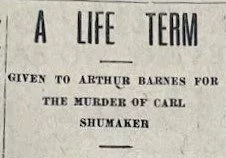
Appeal made on behalf of Louisiana man’s killer
Editor’s note: Following is the third part of a story series by contributing writer Brent Engel.
Arthur Barnes was grateful when he avoided the death penalty in the murder of a 35-year-old father of three.
The 22-year-old admitted to shooting Stark Brothers employee Carl Shumaker near Elsberry on Feb. 17, 1925.
Shumaker was pursuing Barnes and two accomplices after they stole a car from nursery executive Clay Stark the previous day.
On March 14, Judge Edgar Woolfolk sentenced Barnes to life in prison for the murder and 25 years in the car theft. R.S. Kleckner of The Quincy Whig-Journal set the courtroom scene.
“Barnes sat down and slouched in his chair, crossing his legs in the cool attitude so characteristic of him,” the reporter offered. “His head dropped forward and his eyes sought the floor.”
Barnes ignored his wife, Elsie, who had brought their two young children, one of whom cried while the other slept after eating half a cookie.
Woolfolk ordered the defendant to describe the crime. Barnes said he told his accomplices that Shumaker knew them and that if they were caught it meant prison.
‘“If you say so, I’ll bump him off,”’ Barnes said he told his buddies. “They said ‘Bump him,’ so I got out of the car and went to meet him.”
Barnes testified Shoemaker wanted the three to return with him to Louisiana.
“Shoemaker stood with his hand on his hip, and I was afraid he was going to draw,” said Barnes, noting that the victim collapsed after the fourth shot. “I fired once after he fell.”
Authorities did not say if Shumaker was armed. Barnes admitted to overreacting.
“I fired too quick,” he said. “I am sorry, very sorry I killed him, and I pray to be forgiven.”
There was no mention of the victim’s family, but Elsie Barnes vowed to stand by her man and told the court that her husband “has always been good to me and always provided well for me and the children.”
A letter from Barnes’ mother was read. In it, she pleaded for his life.
“The bible teaches us that God will judge our lives according to the deeds we have done when we stand before him at the throne,” she said. “I pray my dear boy’s life may be spared. God help me and help you and all be with us to the end.”
Woolfolk said Barnes killed Shumaker “willfully, maliciously and with malice aforethought” and that “it would be easy for the law to break his body at the noose.” The requests for mercy by Barnes, his attorneys and his mother convinced the judge otherwise.
Murder charges against the accomplices, 20-year-old Lonnie Clark of Louisiana and 18-year-old Clarence Baker of Quincy, were dropped. Baker was sentenced to 25 years and Clark 15 years for theft of the car.
Clark said he had hauled a lot of illicit booze in his short life, but that it would be a long time before he touched another case of moonshine.
“I don’t know where I’m going, but you can count the years I’m gone,” a smiling Barnes said with equal pragmatism.
The next day, the three were taken to the state penitentiary in Jefferson City. It looked like a scene from “The Shawshank Redemption.”
“Their hair was sheared close, they were stripped of their civilian clothes, the usual bath was administered, regulation prison clothes were issued to them and they were assigned to cells,” The Herald said.
Barnes was given prisoner number 27955, with Baker and Clark getting 27956 and 27957, respectively. They were put in separate cells. Barnes took a job operating a sewing machine in the prison shirt factory. Baker and Clark made shoes.
A case that had prompted so many twists should have come to an end at that point, but there was more intrigue to come.
Next time: Another confession.
CUTLINE FOR PHOTO:
A headline in the March 17, 1925, edition of the Louisiana Press-Journal notes that Arthur Barnes was sentenced to life in prison for the murder of Carl Shumaker.